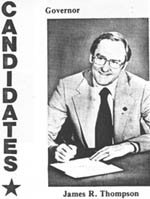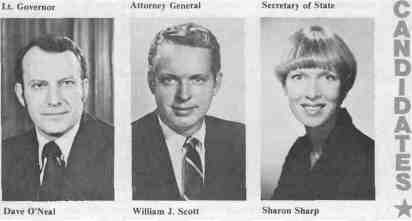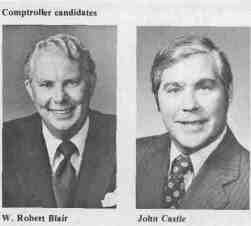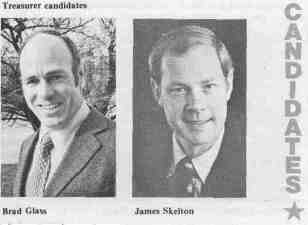UNLIKE the Democratic party, the Republican party in Illinois does not formally endorse candidates for state office. The Democratic State Central Committee, prior to the official filing period in December, formally meets to endorse candidates in a process which has become known as slatemaking. The Republican State Central Committee has long criticized that process, and the members point with pride to what they call an open primary. Don Adams of Springfield, chairman of the GOP state committee, gives his viewpoint of the difference: "We made a conscientious decision not to slate. We want to sincerely encourage qualified persons to enter the primary. We've been successful at it. I'm not sure we could have gotten the candidates we did — such as [Richard B.] Ogilvie and [James R.] Thompson — in a closed process. If a person is qualified, I can look them in the eye and encourage them. They can't do that in the Democratic party. I appreciate their system — I don't knock them — but I think our system is better." In the 1960's this open process resulted in some hard-fought primary campaigns, especially for governor. In 1964, now U.S. Sen. Charles H. Percy defeated now Atty. Gen. William J. Scott for the gubernatorial nomination, and Ogilvie later defeated John Henry Altorfer for the nomination. Several times there were as many as five candidates seeking the party's nomination for the lesser state offices. Since the Republicans have four strong incumbents seeking reelection this year, the only primary contests are for the minor offices of comptroller and treasurer. Phyllis Schlafly of Alton, recognized nationally as the leader of persons opposed to the ratification of the U.S. Equal Rights Amendment, considered challenging Percy for the Republican nomination for the U.S. Senate, but decided against it. She said it would take more than $1 million to defeat Percy in the primary. "That is simply too much for my supporters to spend for one minority vote in Congress," she said. "I think it is more important to support courageous legislators of both parties than to elect me to any office." Although few party leaders thought Schlafly could defeat Percy, they feared she would damage his chances against the Democratic challenger in the fall. Conservatives have long considered Percy too liberal, and they would have. emphasized such issues as the Panama Canal in an attempt to embarrass him. "We will consider many vital issues that concern every Illinoisan," Percy said in his formal announcement for a third term. "Inflation that picks the pocket of every wage-earner; unemployment that robs individuals of dignity and livelihood; the energy crisis that has skyrocketed home heating costs; crime that makes far too many citizens fearful prisoners in their homes and neighborhoods." Gov. Thompson, who will coordinate his campaign advertising with Percy, formally announced November 28 he would seek reelection: "I am proud of the accomplishments which the Thompson-0'Neal administration was able to achieve in such a short period of time and the negative trends of such longstanding that we were able to reverse." He cited a balanced budget, government reorganization, tough sentencing legislation and his road program. Incumbent Lt. Gov. Dave O'Neal announced with Thompson, and no one challenged him in the primary either. On the ballot for the November general election, they are listed as a team, as the new Constitution requires. The fourth Republican to file for reelection was the attorney general. Scott, the recipient of bad publicity as the result of the admission that he had one time kept nearly $50,000 in a safe deposit box, didn't even bother to formally announce he would seek a fourth term. The Republicans had the top of the ticket well established prior to the filing period. Four incumbents-- each of whom had won their last election by more than a million votes--would begin the campaign as heavy favorites. The battle in the Republican primary would be for the nomination to the other executive offices.
Sharon Sharp, 37, of Arlington
Heights, announced September 12 she
would seek the GOP nomination for
secretary of state. Sharp, the Elk Grove
Township clerk and Cook County GOP
chairwoman, said: "The office of secre- 4 / March 1978 / Illinois Issues tary of state should not be used as a political steppingstone while its services remain antiquated and its responsibilities to the people go unmet. I am not a wheeler-dealer, nor am I looking for personal advancement at the voter's expense. I want to serve the people of this state and I am prepared to devote all necessary time, energy and ability to that cause." No one challenged her for the nomination, probably for two reasons. First, a woman candidate strengthened the entire ticket; and, more importantly, few Republicans figured incumbent Democrat Alan Dixon could be defeated. Republicans have primary contests for the other two offices, which are financial offices, for which incumbents are not seeking reelection. Donald Smith, a Republican, was appointed treasurer in January 1977 after Dixon vacated the office to become secretary of state. The appointment was made by Thompson on Dixon's recommendation — with the agreement that Smith would not seek election to the office. State Sen. Bradley M. Glass of Northbrook told party leaders at the end of the legislative session in June that he was interested in the office. In his formal announcement, Glass said: "As state treasurer I shall see that the state revenues are used to support the economy of the state and expand business and job opportunities to the greatest extent possible." He emphasized that he should deposit the money on a geographical bassis with banks willing to meet minimum interest rate requirements.
'We made a conscientious
decision not to slate.
We want to sincerely
encourage qualified
persons to enter the
primary. We've been
successful at it.'
State Rep. Lee Daniels of Elmhurst sought support, then dropped out of contention for treasurer. James Skelton, 38, of Champaign, the Champaign County treasurer, announced August 8 he would seek his party's nomination for treasurer: "The office of state treasurer should be that of the investment banker for state government, and the placement of funds should be on a strict bid basis, and the current practice of placement of funds based upon a bank's record of community service should be abolished." John Castle, 44, of DeKalb, the director of the state Department of Local Government Affairs, announced October 6 he would also run for treasurer: "I strongly believe that the treasurer's office should be utilized to strengthen the capabilities of local financial institutions and local governments to maintain and expand economic opportunities at the local, community level in critical areas such as housing, employment, community development and business and commerce." Two other potential candidates, Cook County State's Atty. Bernard Carey and former Comptroller George W. Lindberg, said they would not run for treasurer. Carey said he would complete his term as state's attorney, and Lindberg became a candidate for appellate judge in Northern Illinois. Rather surprisingly, the field for treasurer was crowded while at the same time no strong candidate appeared for comptroller, even though the incumbent, Democrat Michael J. Bakalis, was certain to seek another office. (Robert Gray of Springfield announced for the office, but never became an official candidate.) During this pre-filing period in October, W. Robert Blair, the former speaker of the Illinois House, let it be known he was interested in the office. In an obvious attempt to discourage Blair from seeking the office, Thompson persuaded his cabinet director, Castle, to switch from the treasurer's to the comptroller's race. "It seems the office of comptroller has been largely ignored," Castle said, in explaining the switch. "The governor has given me his endorsement and I have been encouraged by a lot of people. The governor is a very persuasive individual." The governor had repeatedly said during the summer that he would not become involved in the GOP primaries. He claims his decision to endorse Castle is consistent with that policy because no other strong candidate had announced for the office. Blair, for one, did not accept the
March 1978/ Illinois Issues/5
governor's explanation. In formally announcing his candidacy November 17, he compared Thompson's endorsement of Castle to the "bossism" of the late Chicago Mayor Richard J. Daley. "Historically, the Republican Party has had open primaries and we're proud of it," Blair said. "He [Thompson] does not do any service to the open primary. On reflection, I hope he realizes that people do not cotton to a person in a powerful position dictating who the other candidates will be." Blair said he recognizes the governor as the titular head of the party, but he also referred to Thompson's action as heavy-handed. As a practical matter, in recent history Republican governors have played a key role in the leadership of the party. Ogilvie was the dominant figure in the GOP during his term of office (he still plays a role), and when he sought reelection he chose the candidates for the other offices. William G. Stratton attempted to do the same thing when he served as governor from 1952-60. Some persons have suggested the Blair-Castle contest will be a referendum of sorts on the governor's popularity in his own party — a test of political leadership. Adams, the party chairman, disagrees. "I honestly don't think that's the case. If Castle loses, it won't reflect on Thompson."
Although the two parties differ in
their approach to endorsing candidates,
the result this year has been remarkably
similar. The major battles in the Democratic primary will be for treasurer and
comptroller because candidates are
challenging the slated candidates, and
the focus of attention in the GOP will
likewise be on the two financial offices. 6 / March / 1978 / Illinois Issues |
||||||||||||||||||




